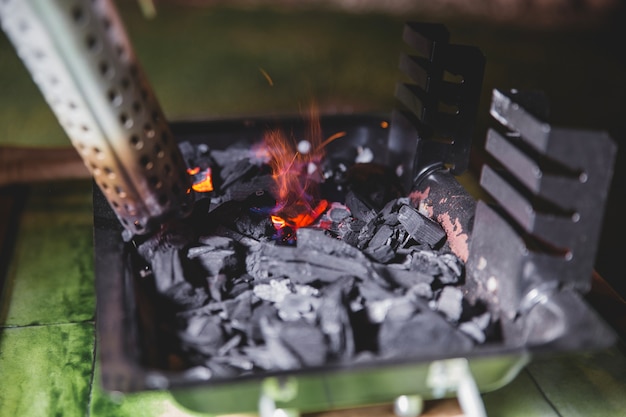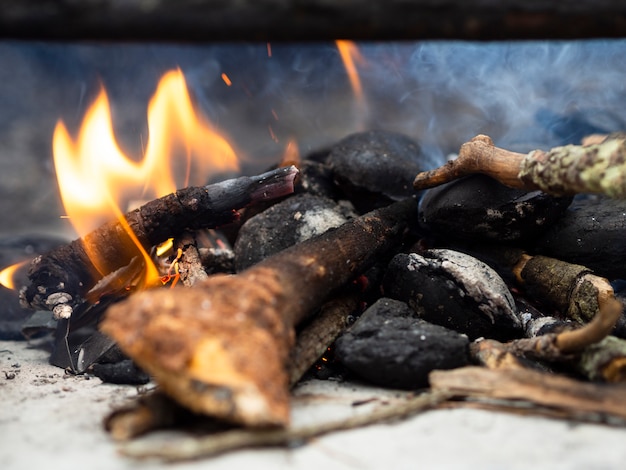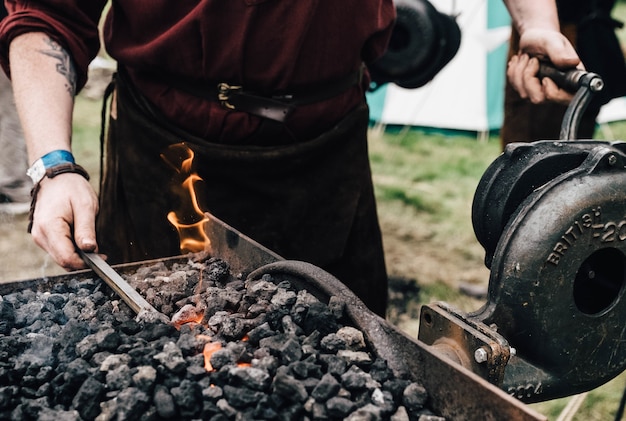Can you reuse charcoal?
Charcoal is a common fuel source used for grilling and barbecuing. After cooking, many people wonder whether they can reuse the leftover charcoal for their next cookout. While it may seem like a logical way to save money and reduce waste, there are a few factors to consider before reusing charcoal.
Quality of the charcoal
The first thing to consider is the quality of the leftover charcoal. Charcoal briquettes contain binders and additives that help them burn evenly. Reusing partially burned or damp charcoal can affect its performance, as it may not reach the necessary temperature for proper cooking. Additionally, the ash and debris from the previous use can clog the airflow and hinder combustion.
Storage conditions
The storage conditions of the charcoal also play a significant role in determining whether it can be reused. If the charcoal was exposed to moisture or kept in a humid environment, it may have absorbed water, making it difficult to ignite. Storing charcoal in a dry and airtight container can help maintain its quality for future use.
Reuse options
If you are considering reusing charcoal, there are a few options available:
- Reusing unburned charcoal: If there are large pieces of unburned charcoal left after cooking, they can be used again for your next grilling session. Make sure to remove any ash or debris before igniting.
- Combining with fresh charcoal: If you have a small amount of leftover charcoal, you can mix it with fresh charcoal to extend its usage. This can help you save on fuel costs while ensuring a consistent heat source.
- Using for other purposes: Leftover charcoal can be repurposed for various tasks around the house. It can be used to absorb odors in the refrigerator, as a natural fertilizer for plants, or even as a dehumidifier.
Considerations and precautions
While reusing charcoal can be an economical option, there are a few considerations and precautions to keep in mind:
- Avoid reusing partially burned charcoal: If the charcoal has only been partially burned, it may not provide sufficient heat for cooking. It’s best to use fresh charcoal for optimal results.
- Inspect the charcoal: Before reusing, inspect the charcoal for any signs of mold, mildew, or insect infestation. Using contaminated charcoal can affect the taste and safety of your food.
- Dispose of ash properly: After each use, dispose of the ash from the charcoal in a safe manner. Hot ash should be left to cool completely before being disposed of in a non-flammable container.
Tip: To maximize the efficiency of your charcoal, consider using a chimney starter to ignite the charcoal evenly and quickly. This can help ensure consistent heat throughout the grilling process.
In conclusion, while it is possible to reuse charcoal, it is important to assess its quality, storage conditions, and purpose. Reusing unburned charcoal or combining it with fresh charcoal can help reduce waste and save money. However, always prioritize safety and ensure that the charcoal is free from contaminants before using it again. With proper care and consideration, you can make the most out of your charcoal for multiple cookouts.
How do you use leftover charcoal?
After a delightful barbecue, you may find yourself with leftover charcoal that can still be put to good use. Instead of throwing it away, here are some clever ways to make the most of your remaining charcoal:
1. Deodorize your fridge
If your refrigerator is emitting unpleasant odors, charcoal can help absorb them. Place a bowl of leftover charcoal in the back of your fridge to neutralize any unwanted smells.
2. Improve soil drainage
Charcoal can be used in gardening to improve soil drainage. Crush the charcoal into small pieces and mix it with your potting soil or garden beds. It will help retain moisture and prevent waterlogging.
3. DIY air freshener
Create your own natural air freshener by placing leftover charcoal in a porous bag (such as a muslin cloth) and adding a few drops of essential oil. Hang these bags around your home to freshen the air.
4. Remove excess moisture
If you have damp areas in your home, like a basement or closet, charcoal can help absorb excess moisture. Simply place a container filled with charcoal in these areas to reduce humidity.
5. Water filtration
Charcoal is known for its ability to purify water. Create a simple DIY water filter by layering activated charcoal, sand, and gravel in a clean container. Pour water through this filter to remove impurities.
“Leftover charcoal can be repurposed for various practical uses, from deodorizing your fridge to improving soil quality.”
Next time you have leftover charcoal, remember that there are many creative ways to continue benefiting from it. Give these ideas a try to reduce waste and make the most of your resources!
Can you reuse charcoal after it gets wet?
Charcoal is a popular fuel source for barbecues and grills due to its high heat output and long burn time. However, one common concern among grill enthusiasts is what to do if their charcoal gets wet. Can you reuse charcoal after it gets wet? Let’s find out!
Effects of water on charcoal
Water can have a significant impact on charcoal, especially if it is completely soaked. When charcoal gets wet, it absorbs moisture and becomes difficult to ignite. The waterlogged charcoal may take longer to light or may not light at all, resulting in frustration and wasted time.
Reusing dry charcoal
If your charcoal only has minimal moisture exposure, you can still reuse it. Simply make sure the charcoal is completely dry before attempting to use it again. Spread the affected charcoal out in a dry area and let it air dry thoroughly, which may take a few days depending on the weather conditions.
When to discard wet charcoal
In some cases, it is best to discard wet charcoal. If your charcoal has been heavily soaked or has been mixed with lighter fluid that has also been exposed to water, it is safer to start with fresh charcoal. Wet charcoal can create excessive smoke and emit unpleasant odors when burned, affecting the taste of your food.
Proper storage to prevent charcoal from getting wet
To avoid the hassle of dealing with wet charcoal, it is essential to store it correctly. Keep your charcoal in a dry, airtight container or sealed bag to protect it from moisture. Additionally, store it in a cool, dry place like a garage or shed, away from direct sunlight or water sources.
Conclusion
In most cases, it is possible to reuse charcoal after it gets wet, as long as it only has minimal moisture exposure. However, if your charcoal has been heavily soaked or mixed with wet lighter fluid, it is best to discard it and start with fresh charcoal for better results. Proper storage is crucial to prevent charcoal from getting wet in the first place. Remember to keep it in a dry, airtight container or sealed bag and store it in a cool, dry place to ensure its effectiveness when you’re ready to fire up the grill next time!
How do you dispose of charcoal after BBQ?
Charcoal is a popular fuel choice for barbecues, providing an intense heat that is ideal for grilling. However, once the charcoal has burned out, many people are unsure how to properly dispose of it. Here are some tips on how to safely and responsibly dispose of charcoal after a BBQ.
Allow charcoal to cool
Before disposing of charcoal, it is essential to allow it to cool completely. Hot or warm charcoal can pose a fire hazard and should never be thrown away. Give the charcoal enough time to cool down naturally before attempting disposal.
Proper container for disposal
Once the charcoal has cooled down, it can be placed in a metal container specifically designated for ash disposal. This container should have a tight-fitting lid to prevent any remaining embers from reigniting. It is essential to use a metal container as opposed to plastic, as hot charcoal can melt plastic containers.
Dispose of ash and debris
After the charcoal has been placed in a metal container, seal the lid tightly and safely store it until you are ready to dispose of it. When disposing of charcoal, make sure to separate ash from other debris or waste to avoid contamination. **Never mix charcoal with other substances**.
Tip: If you use lump charcoal, you can dispose of the ashes in your compost bin, as long as there were no additives present in the charcoal. Ashes can provide nutrients to your garden plants.
Proper disposal methods
The appropriate method of disposal will depend on local regulations and guidelines. In the UK, you may be able to dispose of the charcoal and ash in your regular household waste bin if it has completely cooled and is stored in a proper container.
Alternatively, you can also check with your local council or waste management authority for any specific guidelines on disposing of charcoal and ash. They may provide designated areas or collection points for such waste.
Remember to always prioritize safety when dealing with hot coals. By following these guidelines, you can ensure the responsible disposal of charcoal after a BBQ, keeping both your home and the environment safe.
What to do with Coals After BBQ?
After enjoying a delicious barbecue, you may be wondering what to do with the leftover coals. Properly handling and disposing of the coals is important for safety and environmental reasons. Here are some options:
1. Allow Them to Cool Down
Before doing anything else, make sure the coals have completely cooled down. Leaving them in the barbecue grill with the lid closed will help extinguish any remaining embers. Do not attempt to handle or dispose of hot coals as this can lead to accidents and injuries.
2. Reuse the Coals
If you have hardwood lump charcoal, you can reuse the coals for your next grilling session. Simply remove any ashes or debris and store them in a dry place. The next time you barbecue, add fresh charcoal on top of the reusable coals to extend their lifespan.
3. Dispose of Ashes Safely
Once the coals have cooled down, you can safely dispose of the ashes. Use a metal scoop or shovel to transfer the ashes into a metal container with a lid. Make sure the lid is tightly sealed to prevent any airflow that could potentially reignite the ashes. Wait for a few days before discarding the container in your regular trash bin.
4. Recycle Charcoal Briquettes
If you used charcoal briquettes for your barbecue, you can recycle them if they haven’t been treated with lighter fluid. Check with your local council or recycling center to see if they accept charcoal briquettes for recycling. This is a more eco-friendly option compared to sending them to a landfill.
5. Compost Wood Charcoal
Wood charcoal, such as hardwood lump charcoal, can be composted. Make sure there are no additives or chemicals in the charcoal before adding it to your compost bin. The charcoal will break down over time, adding nutrients to your compost that can benefit your garden.
“Properly handling and disposing of barbecue coals is essential for safety and the environment.”
Remember, always prioritize safety when handling coals and follow any instructions provided by the manufacturer. By responsibly managing your barbecue coals, you can ensure a safe and enjoyable grilling experience while minimizing your impact on the environment.


